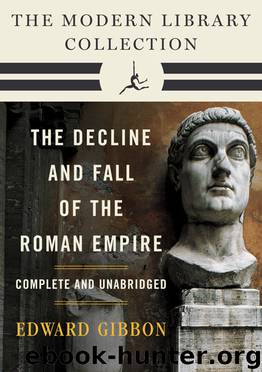Decline and Fall of the Roman Empire by Edward Gibbon

Author:Edward Gibbon [Gibbon, Edward]
Language: eng
Format: epub, mobi
ISBN: 978-0-8129-8483-5
Publisher: Random House Publishing Group
Published: 2013-01-28T16:00:00+00:00
86 As M. de Valois and the P. Ruinart are determined to change the Mosella of the text into Mosa, it becomes me to acquiesce in the alteration. Yet, after some examination of the topography, I could defend the common reading.
87 The parents of Gregory (Gregorius Florentius Georgius) were of noble extraction (natalibus illustres), and they possessed large estates (latifundia) both in Auvergne and Burgundy. He was born in the year 539, was consecrated bishop of Tours in 573, and died in 593, or 595, soon after he had terminated his history.
88 Decedente atque immo potius pereunte ab urbibus Gallicanis liberalium culturǎ literarum, &c., is the complaint of Gregory himself, which he fully verifies by his own work. His style is equally devoid of elegance and simplicity. In a conspicuous station he still remained a stranger to his own age and country; and in a prolix work (the five last books contain ten years) he has omitted almost everything that posterity desires to learn. I have tediously acquired, by a painful perusal, the right of pronouncing this unfavourable sentence.
89 The French antiquarians establish as a principle that the Romans and Barbarians may be distinguished by their names. Their names undoubtedly form a reasonable presumption; yet in reading Gregory of Tours, I have observed Gondulphus, of Senatorian or Roman extraction, and Claudius, a Barbarian.
90 Eunius Mummolus is repeatedly mentioned by Gregory of Tours, from the fourth to the seventh book. The computation by talents is singular enough; but, if Gregory attached any meaning to that obsolete word, the treasures of Mummolus must have exceeded £100,000 sterling.
91 The Salic law does not provide for the safety of the clergy, and we might suppose, on the behalf of the more civilized tribe, that they had not foreseen such an impious act as the murder of a priest. Yet Prætextatus, archbishop of Rouen, was assassinated by the order of queen Fredegundis, before the altar.
92 M. Bonamy has ascertained the Lingua Romana Rustica, which, through the medium of the Romance, has gradually been polished into the actual form of the French language. Under the Carlovingian race, the kings and nobles of France still understood the dialect of their German ancestors.
93 It should seem that the institution of national assemblies, which are coeval with the French nation, has never been congenial to its temper.
94 Spain, in these dark ages, has been peculiarly unfortunate. The Franks had a Gregory of Tours; the Saxons, or Angles, a Bede; the Lombards, a Paul Warnefrid, &c. But the history of the Visigoths is contained in the short and imperfect chronicles of Isidore of Seville and John of Biclar.
95 Such are the complaints of St. Boniface, the apostle of Germany, and the reformer of Gaul. The four-score years, which he deplores, of licence and corruption would seem to insinuate that the Barbarians were admitted into the clergy about the year 660.
96 The Code of the Visigoths, regularly divided into twelve books, has been correctly published by Dom Bouquet. It has been treated by the president de Montesquieu with excessive severity.
Download
Decline and Fall of the Roman Empire by Edward Gibbon.mobi
This site does not store any files on its server. We only index and link to content provided by other sites. Please contact the content providers to delete copyright contents if any and email us, we'll remove relevant links or contents immediately.
The Daily Stoic by Holiday Ryan & Hanselman Stephen(3299)
The Fate of Rome: Climate, Disease, and the End of an Empire (The Princeton History of the Ancient World) by Kyle Harper(3055)
People of the Earth: An Introduction to World Prehistory by Dr. Brian Fagan & Nadia Durrani(2727)
Ancient Worlds by Michael Scott(2682)
Babylon's Ark by Lawrence Anthony(2671)
The Daily Stoic by Ryan Holiday & Stephen Hanselman(2569)
Foreign Devils on the Silk Road: The Search for the Lost Treasures of Central Asia by Peter Hopkirk(2455)
India's Ancient Past by R.S. Sharma(2450)
MOSES THE EGYPTIAN by Jan Assmann(2411)
The Complete Dead Sea Scrolls in English (7th Edition) (Penguin Classics) by Geza Vermes(2277)
The Earth Chronicles Handbook by Zecharia Sitchin(2226)
Lost Technologies of Ancient Egypt by Christopher Dunn(2223)
24 Hours in Ancient Rome by Philip Matyszak(2078)
Alexander the Great by Philip Freeman(2064)
Aztec by Gary Jennings(2021)
The Nine Waves of Creation by Carl Johan Calleman(1915)
Curse Tablets and Binding Spells from the Ancient World by Gager John G.;(1860)
Before Atlantis by Frank Joseph(1849)
Earthmare: The Lost Book of Wars by Cergat(1823)
